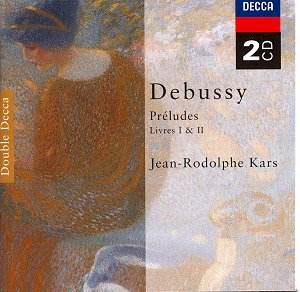When Jean-Rodolphe Kars, a winner of the 1968 Messiaen
Competition and runner up in Leeds in 1966, first released his reading
of the Debussy Préludes in 1971 (on Decca 3BB107/8), he
came into direct competition with fellow Frenchman and Messiaen Competition
winner from 1967, Michel Béroff. Béroff’s name is more
frequently uttered these days (although perhaps not that much more so),
so this reissue brings a ripe opportunity for reappraisal for his colleague.
Kars’ Debussy is characterised by a delicacy of touch
and virtuoso pedal control. He is not afraid to summon up an archetypically
Debussian haze when he feels it warranted (his Cathédrale
engloutie is misty and shrouded in pedal, as is his Brouillards
from Book 2), but he also possesses a crisp, often capricious staccato
which results in, for example, a flitting Puck (complete with horn calls
which really do sound as such). The distant rumblings of the West Wind
Prelude are suitably evocative, and his Sérénade interrompue
is truly guitar-like. Only Minstrels is under-characterized,
not quite close enough to the tumbling, floppy commedia dell’arte
figures Debussy so memorably evokes.
There is no doubting Kars’ technique: just listen to
the amazing fingerwork of Les fées sont d’exquises danseuses,
or the exquisitely placed chords of Canopes. Surprisingly, and
a little disappointingly, it is Feux d’artifice which emerges
on the careful side. The only other clear let-down of Kars’ traversal
comes at the climax of La Cathédrale engloutie, where
the tension sags in the lead-up passage.
Competition in this repertoire is fierce. It needs
hardly to be said, surely, that every collection should include Gieseking’s
1953/4 account of the Préludes (now on a single EMI Great
Recordings of the Century disc, CDM5 67233-2). Zimmerman provides a
recommendable experience from nearer our contemporary perspective (DG
435 773-2, on two discs). This is not to imply that Kars is infinitely
inferior: he plays with a great amount of character and this account
will provide an excellent alternative version.
I have deliberately left mention of one Prélude
until after my summing-up. Kars’ erotic, spell-binding performance of
La terrasse des audiences du clair de lune is actually directly,
forward-lookingly evocative of the world of Messiaen, and this connection
is made explicit by the three pieces by this composer (originally from
SXL6378, where they were coupled with a selection of pieces by Liszt).
In the music of Messiaen, Kars is particularly mesmerising. There is
a hushed fragility to ‘Regard du silence’, but it is with the quarter
of an hour long Le Merle bleu that he impresses most. This is
a rapt and compelling account during the course of which Kars chooses
to show the reciprocal Debussian side of Messiaen (about five minutes
in).
The Debussy Fantaisie was originally (and intriguingly)
coupled with the Delius Piano Concerto in C minor on Decca SXL6435.
Here it is inserted in between the two sets of Préludes: but
in Kars’ hands it is far more than an interlude. Whether in the tender
Largo e molto espressivo introduction to the second movement,
or in the more impressive later stages (Allegro molto, where
it is certainly ‘molto vivace’), this is a performance which,
it is to be hoped, will win converts to this seldom-heard piece. The
recorded balance is more than acceptable, and Gibson accompanies magnificently.
In sum, this is a first-class bargain which will handsomely
supplement any Debussy collection.
Colin Clarke


